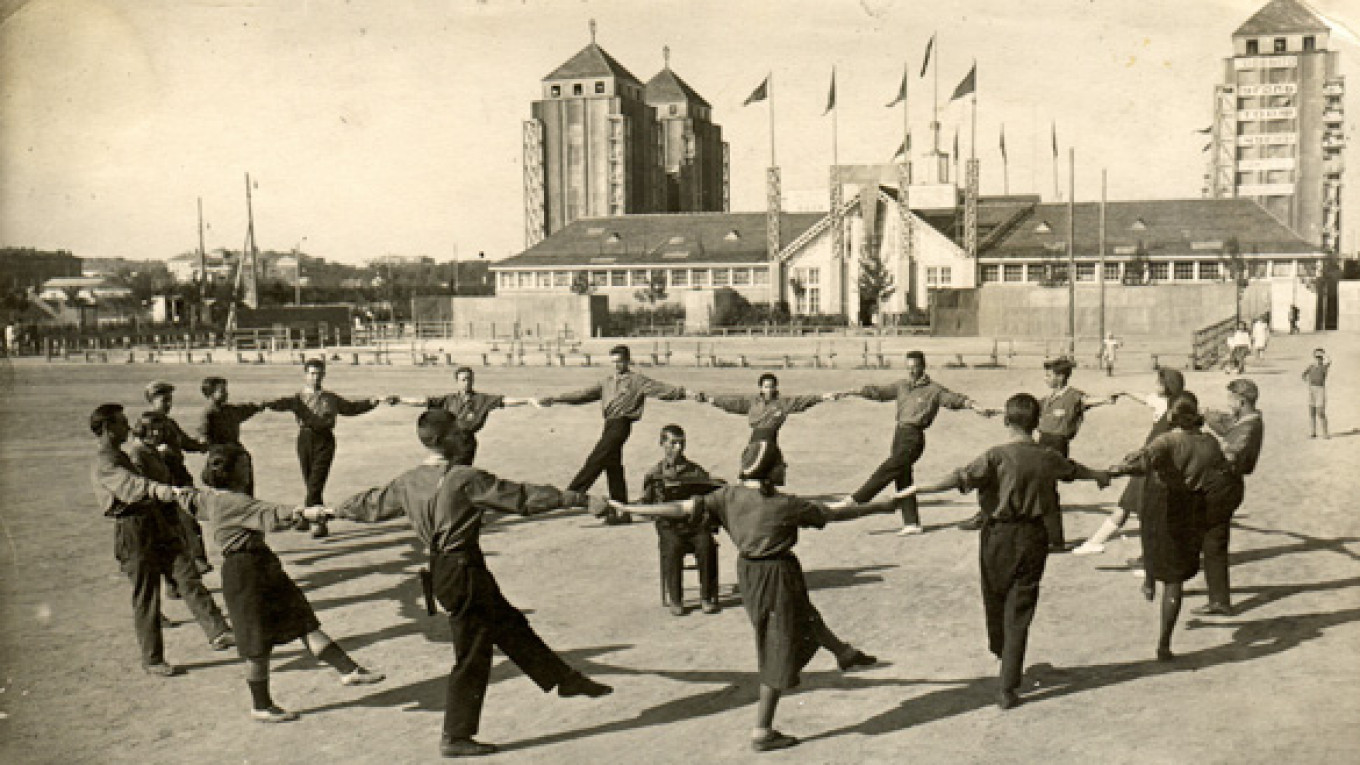The Garage Center for Contemporary Culture has set up home in an innovative "temporary" pavilion in Gorky Park designed by Japanese architect Shigeru Ban.
The structure, located near the park's Pionersky Prud, uses locally produced cardboard tubes for its distinctive columns and continues the park's tradition of temporary structures.
Garage, which was established by Dasha Zhukova, Roman Abramovich's partner, had huge success at its previous incarnation at the Bakhmetevsky bus garage, which it left last year, with a series of big name exhibits such as Marina Abramovic and Mark Rothko.
The center's first exhibition, "Temporary Structures in Gorky Park: From Melnikov to Ban" charts the architectural history of the park with rare archival drawings and footage, many of which have never been seen before. Designs bring to life the colorful decoration of buildings, such as the artisanal pavilion and the pavilion of the Far East, buildings normally only seen in grainy black and white.
The pavilion is home to a 800-square-meter exhibition space, as well as a bookshop and café.
Temporary structures in Soviet Moscow often produced groundbreaking and progressive experimentation. Built to commemorate a moment in history or a state event in the park, they were also used as vehicles for political expression. Architects such as Konstantin Melnikov, Ivan Zholtovsky and Fyodor Shekhtel were among some of those who built temporary structures in the park.
The exhibition takes the viewer from the early 1920s with works such as Konstantin Melnikov's wooden Makhorka pavilion, designed for the tobacco industry, to the aftermath of WWII, when the park fell into disrepair.
Today, Garage not only becomes part of the history of the park, but also confirms its resurrection, the jewel in the crown of its recent total reinvention. Thanks to Sergei Kapkov, the park's director, gone are the cheap bars and dilapidated fairground that made Gorky Park something of an eyesore until last year. On top of Garage, visitors can enjoy mass yoga classes, free Wi-Fi, communal beanbags, skate parks and chichi cafes, as well as frequent highlights in the cultural life of the city.
"Ours is the youngest and fastest developing gallery in Moscow; it is very appropriate that we are now part of Gorky Park's fascinating history," said Anton Belov, director of Garage.
"With this exhibition we hope to show that we have not only become part of that history, but we are developing it and taking it into the future" said Kirstine Wallace, head of Garage's international office.
The pavilion is set to host exhibitions and educational activities until late 2013, when it will be used to house experimental projects. Garage then plans to move to the famous 1960s restaurant "Seasons of the Year," which is being renovated by Dutch architect Rem Koolhas. Initially, the plan was to move to a hexagonal pavilion in the park, built in the 1920s, but that has been put on hold.
"For me it was a great pleasure to make something so complicated in such a short period of time," Shigeru Ban told The Moscow Times, referring to the three months it took in total to make the structure from scratch.
"The lifespan of the building is up to Moscow," he continued "whether a building is permanent or not does not depend on the materials." For Ban, it was always important that he use local materials and also ones that "could be reused and recycled."
"Temporary Structures in Gorky Park: From Melnikov to Ban" runs till Dec. 9. Garage, Gorky Park. Metro. Park Kultury. Tel. +7 (495) 645-0520
Related articles:
A Message from The Moscow Times:
Dear readers,
We are facing unprecedented challenges. Russia's Prosecutor General's Office has designated The Moscow Times as an "undesirable" organization, criminalizing our work and putting our staff at risk of prosecution. This follows our earlier unjust labeling as a "foreign agent."
These actions are direct attempts to silence independent journalism in Russia. The authorities claim our work "discredits the decisions of the Russian leadership." We see things differently: we strive to provide accurate, unbiased reporting on Russia.
We, the journalists of The Moscow Times, refuse to be silenced. But to continue our work, we need your help.
Your support, no matter how small, makes a world of difference. If you can, please support us monthly starting from just $2. It's quick to set up, and every contribution makes a significant impact.
By supporting The Moscow Times, you're defending open, independent journalism in the face of repression. Thank you for standing with us.
Remind me later.






